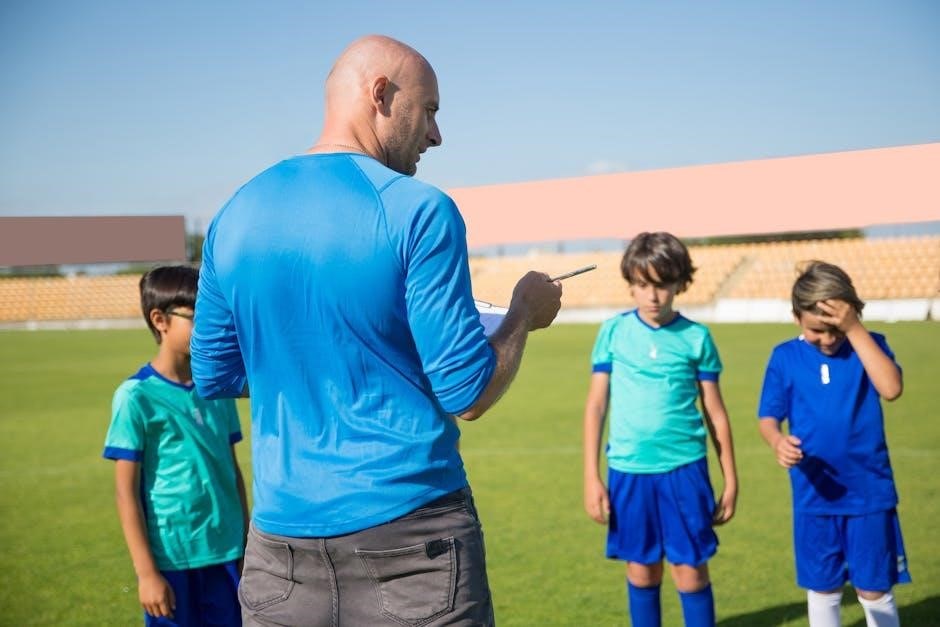Jim Knight is a renowned expert in instructional coaching‚ offering evidence-based strategies to enhance teaching practices. His model emphasizes partnership‚ equality‚ and data-driven decision-making to empower educators.
1.1 Overview of the Jim Knight Coaching Model
Jim Knight’s Coaching Model is built on four core components: beliefs‚ the Impact Cycle‚ coaching skills‚ and strategic knowledge. It emphasizes partnership‚ equality‚ and data-driven practices‚ fostering collaborative relationships between coaches and teachers to enhance instructional effectiveness and student outcomes.
1.2 Importance of Instructional Coaching in Education
Instructional coaching plays a vital role in education by supporting teachers’ professional growth and enhancing classroom practices. It bridges the gap between theory and implementation‚ ensuring evidence-based strategies are applied effectively. Coaches empower teachers to reflect‚ adapt‚ and improve‚ ultimately leading to better student outcomes and a more impactful educational experience.

Key Components of the Jim Knight Coaching Model
Jim Knight’s model includes four core components: beliefs‚ the coaching cycle‚ coaching skills‚ and strategic knowledge. These elements work together to support teachers in improving instructional practices effectively.
2.1 Beliefs and Partnership Principles
Jim Knight’s coaching model is rooted in partnership principles‚ emphasizing equality and collaboration between coaches and teachers. Coaches view themselves as equals‚ fostering a non-hierarchical relationship. This approach motivates teachers to take ownership of their learning and implementation of strategies‚ making the coaching process more effective and sustainable in improving instructional practices and student outcomes.
2.2 The Coaching Cycle: The Impact Cycle
The Impact Cycle‚ developed by Jim Knight‚ is a structured approach to instructional coaching. It consists of three key steps: identifying a clear goal‚ planning actionable strategies‚ and gathering evidence to assess progress. This cycle ensures coaches support teachers in a focused‚ teacher-driven process‚ aligning actions with student needs and fostering continuous improvement in instructional practices.
2.3 Coaching Skills: Listening and Questioning
Jim Knight highlights active listening and thoughtful questioning as essential coaching skills. Coaches must listen deeply to understand teachers’ perspectives and use open-ended questions to guide reflection. These techniques foster independent thinking‚ enabling teachers to identify solutions and take ownership of their professional growth‚ ensuring coaching conversations are collaborative and impactful.
2.4 Strategic Knowledge for Effective Teaching Practices
Jim Knight emphasizes that coaches need deep knowledge of effective teaching strategies to support teachers. This strategic knowledge allows coaches to provide relevant resources and guidance‚ helping teachers implement proven practices. By sharing expertise‚ coaches empower educators to enhance instruction without dictating actions‚ fostering a collaborative and growth-oriented environment focused on student success and teacher development.

Data-Driven Decision Making in Instructional Coaching
Jim Knight’s model highlights the importance of using evidence‚ such as student performance data and classroom observations‚ to guide coaching conversations and improve teaching practices effectively.
3.1 The Role of Evidence in Coaching Conversations
Evidence plays a crucial role in Jim Knight’s coaching model‚ grounding conversations in observable data. Coaches use student performance data and classroom observations to identify areas for improvement and track progress. This approach ensures coaching is actionable and focused on real outcomes‚ helping teachers make informed decisions without being directive‚ thus fostering a collaborative and evidence-driven improvement process.
3.2 Using Student Performance Data to Inform Practices
Student performance data is central to Jim Knight’s model‚ enabling coaches to identify learning gaps and track progress. By analyzing assessments and metrics‚ coaches guide teachers in refining strategies‚ ensuring interventions are targeted and effective. This data-driven approach supports the Impact Cycle‚ helping educators make informed decisions and fostering a culture of continuous improvement focused on student success and teacher growth.

Implementing the Jim Knight Coaching Model
Implementation involves setting clear goals‚ fostering trust‚ and leveraging data to guide teacher development. Coaches support teachers in achieving targeted outcomes through collaborative‚ evidence-based practices and ongoing feedback.
4.1 Identifying Goals and Setting Expectations
Coaches and teachers collaborate to identify clear‚ measurable goals aligned with student needs and evidence-based practices. Expectations are established to guide the coaching process‚ ensuring focused efforts and measurable progress. This step ensures both parties are aligned and committed to achieving specific‚ impactful outcomes for teacher growth and student success.
4.2 Building Trust and Equality in the Coach-Teacher Relationship
Trust and equality are foundational to effective coaching. Coaches and teachers work as equals‚ fostering open communication and mutual respect. Coaches empower teachers to take ownership of their growth‚ ensuring a non-hierarchical relationship. This partnership approach enhances collaboration‚ leading to meaningful professional development and improved instructional practices.

Effective Questioning Techniques for Instructional Coaches
Effective questioning involves asking open-ended‚ non-leading questions to encourage teacher reflection and critical thinking‚ fostering independent problem-solving and ownership of professional growth.
5;1 Powerful Questions to Guide Teacher Reflection
Powerful questions in instructional coaching encourage deep reflection and critical thinking. Jim Knight emphasizes asking open-ended‚ non-leading questions like‚ “What evidence shows your students are learning?” to guide teachers in identifying goals and strategies. These questions foster ownership of professional growth and promote independent problem-solving‚ helping teachers connect their practices to student outcomes effectively.
5.2 Avoiding Leading Questions and Fostering Independent Thinking
Avoiding leading questions is crucial in instructional coaching to prevent bias and ensure teachers explore solutions independently. Coaches should ask open-ended questions that encourage reflection without directing teachers toward specific answers. This approach fosters independent thinking and empowers educators to take ownership of their professional growth‚ aligning with Jim Knight’s emphasis on partnership and equality in the coaching relationship.

Tools and Resources for Instructional Coaching
Jim Knight’s coaching model offers tools like the Whats Your Instructional Coaching Personality Type Quiz and the Impact Cycle and PEERS Goals Framework to support professional growth and evidence-based practices.
6.1 The Whats Your Instructional Coaching Personality Type Quiz
Jim Knight created the Whats Your Instructional Coaching Personality Type Quiz to help coaches identify their strengths and growth areas. This tool enhances self-awareness‚ fostering effective partnerships with teachers. By understanding their coaching style‚ educators can align their practices with evidence-based strategies‚ ultimately improving student outcomes and professional development.
6.2 The Impact Cycle and PEERS Goals Framework
The Impact Cycle is a cornerstone of Jim Knight’s coaching model‚ guiding teachers through goal-setting and implementation. The PEERS Goals Framework complements this by helping educators define clear‚ evidence-based objectives. Together‚ these tools empower teachers to align their practices with student needs‚ fostering measurable improvements in instruction and learning outcomes through structured‚ collaborative coaching processes.

The Role of Technology in Instructional Coaching
Technology enhances instructional coaching by providing tools for video reflection‚ AI-driven feedback‚ and data analysis‚ enabling coaches to support teachers more effectively and efficiently in achieving educational goals.
7.1 Using Classroom Video for Reflection and Feedback
Classroom video tools enable teachers to reflect on their practices by recording and analyzing lessons. Coaches can provide specific‚ actionable feedback‚ fostering professional growth. This technology saves time and offers a secure platform for teachers to improve instruction‚ aligning with Jim Knight’s emphasis on evidence-based coaching and teacher empowerment through reflection and collaboration.
7.2 AI-Based Tools for Supporting Teacher Growth
AI-based tools like VC3 and AI Coach are transforming teacher growth by offering personalized learning paths and real-time feedback. These platforms analyze teaching practices and provide tailored strategies‚ enabling coaches to focus on specific teacher needs. AI also automates data analysis‚ freeing coaches to concentrate on collaborative‚ impactful professional development‚ making instructional coaching more efficient and scalable for educators worldwide.

Case Studies and Success Stories
Case studies highlight successful implementations of Jim Knight’s coaching model‚ showcasing improved teacher practices and student outcomes. Teacher testimonials reveal transformative impacts on professional growth and classroom effectiveness.
8.1 Examples of Successful Instructional Coaching Implementations
Jim Knight’s Coaching with Impact (CWI) Project has been successfully implemented in middle schools‚ improving teaching practices and student outcomes. Schools serving low-income students and students of color have seen significant gains. A step-by-step coaching calendar and targeted professional development have been key factors. These implementations demonstrate how instructional coaching can drive meaningful‚ sustainable change in education.
8.2 Teacher Testimonials on the Impact of Coaching
Teachers have shared powerful testimonials about the transformative impact of Jim Knight’s instructional coaching. Many highlight how coaching fostered a growth mindset‚ helping them implement proven practices and achieve their goals; One teacher noted‚ “My coach empowered me to take ownership of my growth‚ leading to significant improvements in my teaching and student outcomes.” These testimonials underscore the lasting‚ positive effects of effective coaching.

Professional Development for Instructional Coaches
Jim Knight’s Instructional Coaching Group offers comprehensive workshops and training programs‚ equipping coaches with evidence-based strategies and fostering continuous learning to enhance teaching practices and partnerships.
9.1 Training Programs and Workshops by the Instructional Coaching Group
The Instructional Coaching Group‚ led by Jim Knight‚ provides targeted training programs and workshops. These sessions focus on evidence-based strategies‚ fostering collaboration‚ and enhancing instructional skills. Coaches gain practical tools and insights to support teachers effectively‚ ensuring sustainable growth in educational settings through continuous professional development opportunities.
9.2 Continuous Learning and Research in Instructional Coaching
Jim Knight emphasizes the importance of ongoing learning and research in instructional coaching. Coaches are encouraged to stay updated on best practices through research‚ professional reading‚ and collaborative sharing. This commitment to continuous improvement ensures coaches remain effective in supporting teachers and driving student success‚ aligning with the evolving needs of education.

Challenges and Solutions in Instructional Coaching
Instructional coaching faces challenges such as teacher resistance and time constraints. Solutions include building trust‚ fostering collaboration‚ and leveraging data-driven strategies to enhance teaching practices effectively.
10.1 Overcoming Barriers to Effective Coaching
Common barriers to effective coaching include teacher resistance‚ time constraints‚ and communication challenges. Jim Knight emphasizes building trust‚ fostering collaboration‚ and using evidence-based strategies to address these issues. Coaches must also develop strong listening and questioning skills to support teachers in overcoming obstacles and implementing impactful practices. These approaches ensure sustainable growth and mutual respect in the coaching relationship.
10.2 Strategies for Sustaining Coaching Practices in Schools
Schools can sustain coaching practices by embedding professional development‚ fostering a culture of collaboration‚ and using tools like the Impact Cycle. Regular feedback‚ goal-setting frameworks like PEERS‚ and leveraging technology for continuous improvement are key. Building trust and equality in coach-teacher relationships ensures long-term success‚ creating a sustainable environment for teacher growth and student achievement.
Jim Knight’s vision for the future of instructional coaching emphasizes continuous research‚ teacher empowerment‚ and leveraging technology. His model remains pivotal in fostering educator growth and student success.
11.1 The Evolution of Instructional Coaching
Instructional coaching has evolved from traditional directive methods to a more collaborative‚ evidence-based approach. Jim Knight’s model emphasizes partnership‚ equality‚ and data-driven practices‚ shifting the focus to teacher empowerment and student-centered outcomes. The integration of technology‚ such as AI tools and classroom video feedback‚ has further enhanced the coaching process‚ making it more accessible and effective in improving educational practices.
11.2 Jim Knights Vision for the Future of Coaching in Education
Jim Knight envisions a future where instructional coaching is deeply integrated into education‚ leveraging technology and AI to enhance teacher growth. He emphasizes continuous learning‚ adaptability‚ and research-driven practices to meet evolving educational challenges. Knight’s vision prioritizes equity‚ collaboration‚ and sustainable coaching systems‚ ensuring every teacher and student benefits from evidence-based‚ impactful instructional strategies.



